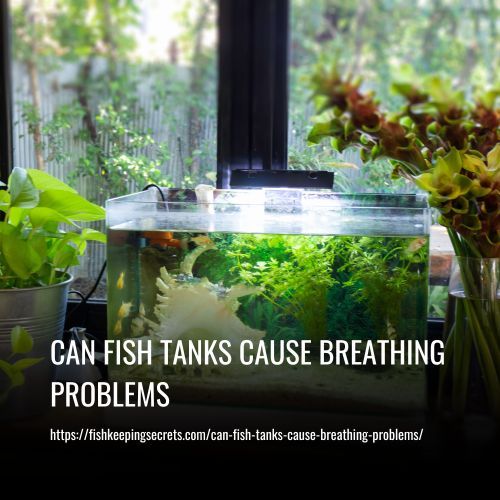Can Fish Tanks Cause Breathing Problems
This post contains affiliate links. As an Amazon Associate, we earn from qualifying purchases.
Fish tanks can potentially cause breathing problems if they are not properly maintained. A poorly maintained fish tank can develop high levels of ammonia and other toxins that can irritate the respiratory system.
In addition, mold or bacteria growth in the tank or filter can release allergens into the air that can trigger respiratory symptoms in sensitive individuals. It is important to regularly clean and maintain fish tanks to prevent these issues.
Moreover, it’s crucial to note that different environmental factors like water chemistry may also affect mold growth in your aquarium. So, keeping an eye on your tank’s cleanliness is not only beneficial for your own well-being but also plays a vital role in ensuring the health of your aquatic pets.

Can a Fish Tank in Your Bedroom Make You Sick?
It is worth considering the potential risks to health that a fish tank in your bedroom can create. The presence of a fish tank can increase humidity levels, which may result in breathing difficulties and challenge your ability to breathe when the air becomes more humid. This could lead to respiratory issues or an increased chance of black mold spores growing, particularly Stachybotrys chartarum, which has been linked to bleeding from the lungs over time.
Once black mold sets in, it can become a chronic problem difficult to eradicate completely. Thus, it is advisable not to let humidity levels get out of hand if you are considering adding a fish tank to your bedroom. In case you love watching fish before bedtime for better sleep quality, you may want them around; just make sure they are kept away from your sleeping area if you’re still cautious about excess humidity levels.
Can Fish Tanks Make Asthma Worse?
Sometimes, fish tanks can be a source of irritants for individuals with asthma, as the dust produced by the tank and the bacteria present in the water may worsen their symptoms. The presence of other allergens commonly found in fish tanks, such as gravel, decorations, and plants, can also affect air quality and exacerbate asthma.
Fish waste proteins may elicit an asthma attack if inhaled when being cleaned. In light of this, it is important to consult with a physician prior to keeping a fish tank at home if someone residing there has asthma in order to take necessary precautions.
What Diseases Can Humans Get From Fish Tanks?
Fish tanks can pose certain health risks to humans due to the presence of bacteria, viruses, fungi, and parasites in the aquarium’s water. Some of the bacterial infections that people can acquire from fish tanks include Pseudomonas, Mycobacteria, Aeromonas, and Edwardsiella. Exposure to contaminated fish tank water, including leptospirosis, can result in the spread of fungal infections and viruses.
Close contact with the tank itself may also lead to infection. Decorations, plants, and equipment within the tank could carry different bacteria such as Salmonella or E.coli which could cause illness if ingested or come in contact with open wounds.
Parasites like flukes and roundworms may likewise be present in fish tank water which can infect humans through contact.
Regular testing and monitoring of tank water are important to identify any dangerous pathogens present. In addition, proper sanitation procedures should be observed when cleaning equipment and changing tank water to help prevent infection risk. Regular maintenance should not be overlooked to ensure a healthy aquarium for the fish as well as for the people who handle it.
Can I Keep Fish Tank In My Bedroom?
Many people wonder if it’s okay to keep a fish tank in their bedroom. The answer is yes, you can, but there are important things to consider. Before adding an aquarium to your bedroom, make sure you set it up properly and maintain it regularly.
Properly caring for fish involves monitoring water quality, maintaining tank cleanliness, and ensuring adequate food and oxygen supply. It is important to consider the preferred water temperature of the desired fish species and select an appropriate tank-sized accordingly.
It’s essential to ensure that your room is warm enough for your fish as well because they need a consistent temperature between 68-77 degrees Fahrenheit. If this isn’t possible, then you may need to install heating or cooling devices in the room.
Overall, keeping a fish tank in your bedroom can be a great way to relax and add beauty to your sleeping quarters. Just remember that taking proper care of your fish is crucial for their health and happiness.
Where Should I Put My Fish Tank In My Room?
There are certain factors to consider when selecting an ideal location for your fish tank in your room. It is recommended to choose a spot that is not exposed to direct sunlight, and avoid placing it near sources of heat, cold, vibrations, or noise disturbances.
Ensure you select a location where you can enjoy viewing your fish tank without disrupting its temperature with coming and going traffic. It’s also important to ensure that the available space in the room can accommodate the size of the tank while providing enough clearance around it.
Access to electrical outlets and plumbing is also key. Plan for any equipment-related needs like heaters and filters by placing them near a power outlet and adequate water supply. Moreover, take note of factors associated with maintaining consistent temperatures in the room such as drafts, radiators, air conditioning, or heaters.
By taking all these factors into account while finding an appropriate spot for your fish tank in your room, you will help ensure that both you and your fish will have an optimal experience.
What Are The Dangers Of Fish Tanks In Bedrooms?
The placement of fish tanks in bedrooms may pose certain risks. The presence of a fish tank can elevate the humidity levels, which can potentially foster the growth of mold and pathogens.
It’s also important to remember that fish tanks need regular monitoring and maintenance, which could be more challenging to do while it is located inside a bedroom. Additionally, installing and maintaining the filter, heater, and lighting on the tank will require the use of electricity. If proper precautions are not taken, this could pose potential risks for those occupying the room.
Lastly, it’s worth noting that excess noise from the filter, heater, and lighting systems may cause disruption during sleep time. Addressing issues such as soundproofing can help alleviate this risk somewhat.
How Do I Get The Fish Tank Smell Out Of My House?
Eliminating the unpleasant fish tank smell from your house can be a daunting task. However, there are several steps you can take to effectively get rid of it. First and foremost, make sure to clean the fish tank thoroughly by scrubbing all surfaces, changing the water, and cleaning the filter. You should use an aquarium-safe cleaning solution to ensure all organic matter causing the smell is eradicated.
Various methods, such as burning scented candles, using essential oils, or lighting incense, can enhance the fragrance of your living space. It’s important to check for mold or mildew in your fish tank as they can cause bad smells that are potentially harmful to people.
To ensure proper ventilation and prevent persistent odors, one can open windows or use fans for air circulation. In addition, carbon filters or activated charcoal available in pet stores can be utilized to contain odor particles.
These tips can aid in decreasing the odor of a fish tank and creating a more enjoyable atmosphere for all inhabitants within your residence.
What Happens If A Fish Tank Is Dirty?
If a fish tank is not regularly maintained, it may develop toxicity that can harm its inhabitants. The accumulation of ammonia and nitrites from lack of cleaning creates poor water quality, which can affect the health of the fish in various ways such as stress, infection, disease, or even death. It is essential to ensure the aquarium’s cleanliness to provide a healthy living environment for the aquatic pets.
Neglecting proper cleaning practices may foster algae growth and unwanted pests like snails that disturb water quality and negatively impact the fish’s well-being. Hence, it is recommended you perform routine water changes and cleanings of substrate and decorations to maintain a clean and healthy aquarium.
What Are The Signs Of Low Oxygen In A Fish Tank?
One of the most important factors in maintaining a healthy fish tank is ensuring that the oxygen levels are adequate for your fish. If the oxygen levels drop too low, your fish can show signs of stress or fatigue, such as swimming erratically or appearing lethargic. They may even stay near the surface of the water, where oxygen levels are higher due to gas exchange with the atmosphere.
Other signs that oxygen levels may be low include fish gasping for air at the surface or struggling and even jumping out of the water. The condition of the water itself can also give clues about oxygen levels as it may become slimy due to increased bacterial presence in low-oxygen environments or look cloudy and murky due to the high organic matter content that consumes oxygen from water.
Increased algae or fungi growth favoring environments with low inter-oxygen levels would also indicate this issue. In addition, decreased activity in all fish present in a tank is another possible sign that there isn’t enough oxygen available.
It’s crucial to monitor your tank’s oxygen levels and take corrective action if needed, including using air pumps or improving filtration systems to ensure proper aeration in your aquarium. Ignoring these issues over time can result in severe consequences such as diseases among fish populations, raised mortality rates, and unsuccessful growth patterns.
FAQs
If the fish tank isn’t cleaned on time, harmful bacteria may grow and cause skin infections in humans. Keep your fish tank clean to ensure your fish and you stay healthy.
Having a fish tank in your bedroom can be calming, but it may also cause noise and health concerns due to the equipment and water. Additionally, there is a minimal risk of infection if you have open wounds or sores and handle the aquarium water.
Fish tank algae can make you sick, so it’s important to clean your aquarium regularly. Algae can cause skin infections if there are any open wounds or scratches. Without regular cleaning, the algae will cover the fish tank in green and make it look unpleasant. It’s essential to get rid of the green coating quickly and keep the fish tank clean to avoid any health risks.
Beware, fish lovers! Don’t let the beauty of your aquatic pets fool you into overlooking the potential risk of parasites. Cleaning up after them could bring more harm than good.
Whether you have a freshwater or saltwater aquarium, these tanks can serve as breeding grounds for pesky tapeworms and roundworms that won’t hesitate to latch onto you. And let’s not forget about those sneaky flatworms lurking in warm seas, just waiting to cause mayhem with trematode disorder. Stay vigilant and keep your aquarium clean, unless you want to end up feeling like a fish out of water.
Having an open wound while working in a saltwater fish tank can cause illnesses for those with weak immune systems. Healthy individuals usually have no problems with it.
Excessive humidity from a tank can result in the growth of bacteria in window frames and carpet corners, leading to allergic reactions. Adequate conditions in a saltwater tank can prevent this. For hobbyists who maintain tanks in living spaces with appropriate humidity levels and ventilation, there is no cause for concern about potential illnesses.
Conclusion:
While fish tanks can provide a beautiful and relaxing environment in your home, they can also pose some risks to your health if not maintained properly. Poor maintenance of the tank can lead to the accumulation of harmful toxins in the air, which can cause respiratory problems.
However, this does not mean that you need to get rid of your fish tank altogether. By adopting good management practices like regular cleaning and ensuring proper ventilation, you can safely enjoy your aquatic pets without putting your health at risk.






